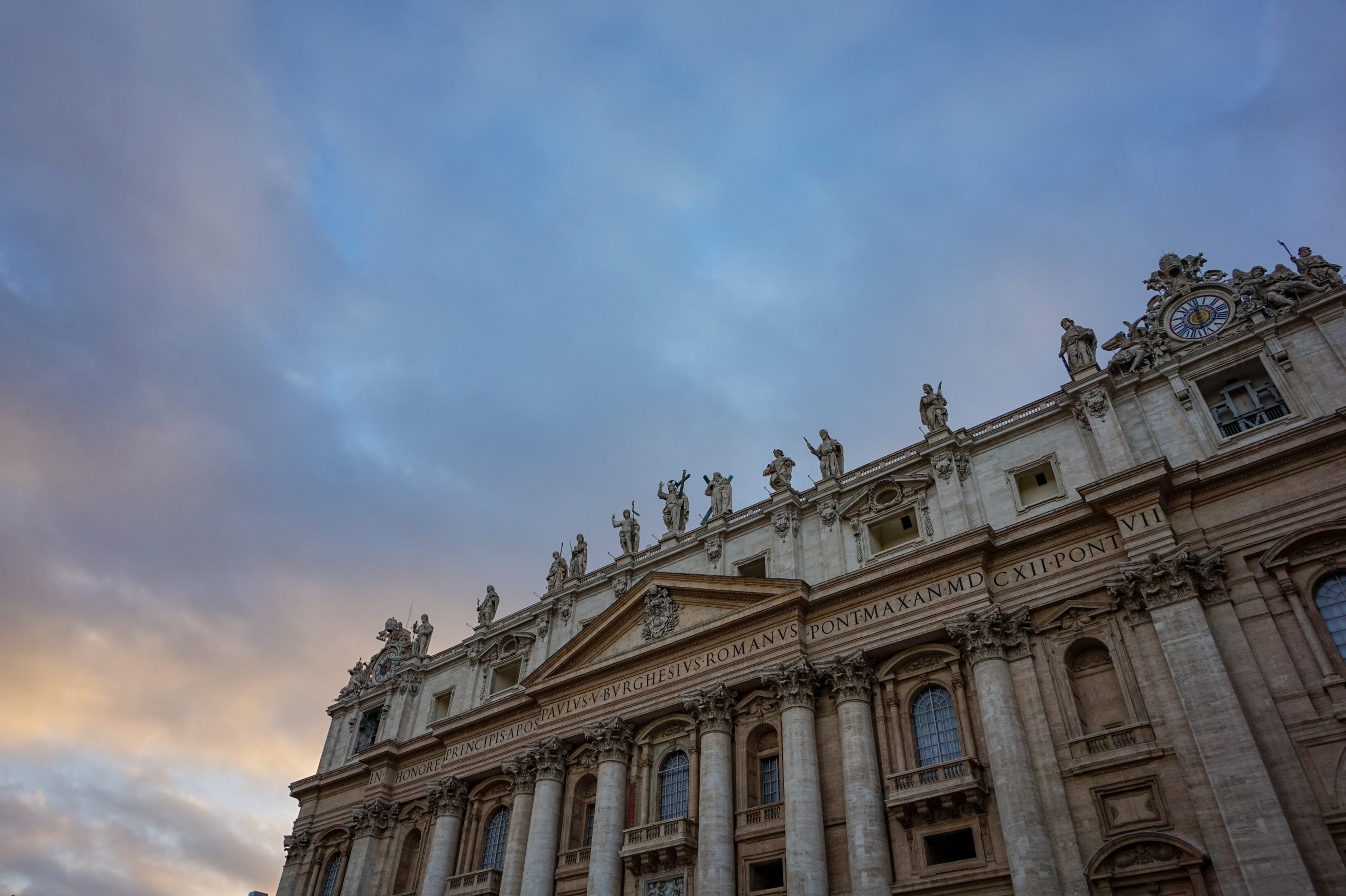
Universalist Response to Particularistic Regression: Political Philosophy behind the Pope Francis Encyclical Fratelli tutti
Mikhail Minakov
Photo by Catherine Dionne from Unsplash
This article is part of our “Fratelli Tutti: Reflections on Pope Francis’s Call for Fraternity in Law and Religion” series.
If you’d like to check out other articles in this series, click here.
The modern history of humanity is driven by several contradictions, one of them being the conflict between universalism and particularism. In a nutshell, numerous universalist frameworks are grounded on the idea that norms and values relate equally to all humans, to all living creatures, or — even more widely — to all forms of being. Universalism strives for unity that transcends all possible differences. Many particularistic agendas do the contrary: they chose a particular quality of one individual group of phenomena, and essentialize that quality. This prescription of essence to a selected group aims at establishing the ontological difference of the chosen faction compared to all other forms of existence.
In today’s world, this contradiction of universalist and particularistic agendas is manifest in many processes, for example: recent globalization and today’s protectionism, liberal interventionism and conservative sovereignism, new solidarism and reinvented ethnonationalism. And currently, it looks as if particularism — with upstreaming demodernization1Yakov Rabkin & Mikhail Minakov (eds.). (2018). Demodernization: a future in the past. Stuttgart: Verlag/ibidem Press., with increasing illiberalism, with declining liberal democracy2Lennart Brunkert, Stefan Kruse & Christian Welzel (2019). A tale of culture-bound regime evolution: the centennial democratic trend and its recent reversal. Democratization, 26:3, 422-443., with the world fragmented to find local responses to the global pandemic — is winning.
In its essence, the encyclical brings back to life one of Christ’s fundamental universalist intentions and St. Francis’ most important message: “love that transcends the barriers of geography and distance…its universal scope, its openness to every man and woman” (paras. 1, 6 of the encyclical). Pope Francis openly states the universalist aim of his message: “It is my desire that, in this our time, by acknowledging the dignity of each human person, we can contribute to the rebirth of a universal aspiration to fraternity. Fraternity between all men and women” (para. 8).
One of the most astounding parts of the papal letter is the analysis of current dangers to the universality of interpersonal fraternal love and dignifying equality of men and women. The understanding of our worlds’ ills, as analyzed by the religious leader, coincides with cutting-edge scholarly studies. For example, Pope Francis points to demodernization: he writes that our world “was slowly moving towards various forms of integration,” but today this integrated world “seem[s] to be showing signs of a certain regression” (para. 11). Further, the Holy Father refers to collapsing historical consciousness: “a growing loss of the sense of history, which leads to even further breakup…in today’s culture” (para. 13). And finally, he points out the damages of postmodern relativism and decadence: “One effective way to weaken historical consciousness, critical thinking, the struggle for justice and the processes of integration is to empty great words of their meaning or to manipulate them. Nowadays, what do certain words like democracy, freedom, justice or unity really mean?” (para. 14).
To cure the ills of failed universalism and booming particularism, Pope Francis offers a universalist solution, not a particularistic one.
This analysis deals not only with the forces that promote inequality but also question the universal nature of humanity. Pope Francis directs our attention to the issues of recent progress and globalization that have betrayed their universal roots. Just like leftist critics of recent globalism, the Pope justly criticizes such progress for not being “for everyone” and for lacking “a shared roadmap”.
To cure the ills of failed universalism and booming particularism, Pope Francis offers a universalist solution, not a particularistic one. The encyclical starts from a social-phenomenological statement of human intersubjectivity: “No one can experience the true beauty of life without relating to others, without having real faces to love. This is part of the mystery of authentic human existence” (para. 87). To avoid the particularistic trap, the Pope adds a very important argument: the mystery of authentic human existence is not limited by family or any other organic community. True intersubjectivity has all of humanity as its horizon — spatially and temporally: “Nor can I reduce my life to relationships with a small group, even my own family; I cannot know myself apart from a broader network of relationships, including those that have preceded me and shaped my entire life” (para. 89). Thus, the conclusion is the need to reassert a new universal project on “a universal love that promotes persons” “without borders.”
Pope Francis repeats Karl Popper’s call for open society3Popper, K. R. (2020). The open society and its enemies. San Francisco, CA: Princeton University Press, though he does so in a new context. This open society must “integrate everyone”, it must treat all its neighbors — near and far — and all rights as rights “without borders,” which calls for “social friendship and universal fraternity” that balance the interests of every person, men and women, and of every group in that society (paras. 97, 106).
In spite of many risks for rationality, the post-secular age seems to add value to the universalist agenda by bringing the scientific worldview and contemporary religious thought in a closer relationship with each other.
Furthermore, the Pope’s encyclical promotes Kant’s request4Kant, I. (1996). An answer to the question: What is enlightenment?(1784). Practical philosophy, 6, 16-22. for human maturity: “Nor can we fail to mention that seeking and pursuing the good of others and of the entire human family also implies helping individuals and societies to mature in the moral values that foster integral human development” (para. 112). Kant’s idea of maturity in this context is ascribed not only to individuals but also to societies.
Based on this intersubjective interpretation of a morally mature, open society; and of humanity as a necessary horizon of moral action, the encyclical — for its final conclusion — stipulates the duty of exercising “political love” as a form of “social and political charity” and of “dialogue and friendship in society” (paras. 176-180). Thus, liberal ideas of good politics and good society are united with the ideas of open society and moral maturity in one progressive project for all.
Science and religion have a long history of rivalry. Universalism has long been a hostage in the conflict between religious faith and secular reason. In spite of many risks for rationality, the post-secular age seems to add value to the universalist agenda by bringing the scientific worldview and contemporary religious thought in a closer relationship with each other. The normative horizon of universalism is definitely getting new inspiration from the ideas, arguments, and conclusions of the Fratelli tutti encyclical. And these should not remain unappreciated by those in secular universalist circles. ♦

Dr. Mikhail Minakov, senior advisor at Kennan Institute, Woodrow Wilson Center for International Scholars, is an internationally renowned philosopher and social scholar working in the areas of political philosophy, political theory and history of modernity in the Eastern Europe and Western Eurasia. Author of six books, co-author of 4 books, and many articles in philosophy, political analysis, and policy studies, Minakov has over twenty years of experience in research and teaching in Ukraine, Germany, USA and Switzerland. As an editor-in-chief he also runs a peer-reviewed Ideology and Politics Journal and the Kennan Institute’s blog Focus Ukraine.
Recommended Citation
Minakov, Mikhail. “Universalist Response to Particularistic Regression: Political Philosophy behind the Pope Francis Encyclical Fratelli tutti.” Canopy Forum, November 17, 2020. https://canopyforum.org/2020/11/17/universalist-response-to-particularistic-regression/

